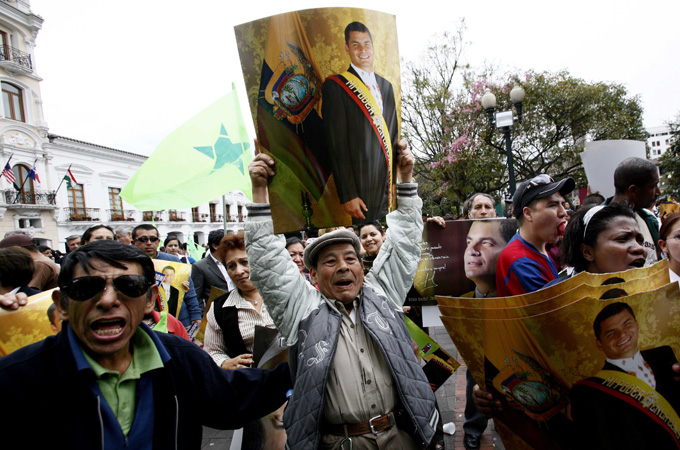Snap analysis of the Ecuador mutiny

 |
| Correa is popular among the poor for spending oil cash on welfare programmes [AFP] |
The president of Ecuador has come out defiant after troops were called to free him from a hospital where renegade police, protesting against a law reducing their benefits, kept him under seize.
But while it was not clear whether there was a real coup attempt or whether police protests simply ran out of control, the event was the most serious threat to Correa’s position during nearly four years in office.
Keep reading
list of 4 itemsChina’s economy beats expectations, growing 5.3 percent in first quarter
Inside the pressures facing Quebec’s billion-dollar maple syrup industry
Manipur’s BJP CM inflamed conflict: Assam Rifles report on India violence
Following are some possible implications of the uprising:
Correa has had a mixed relationship with the armed forces since he assumed office in January 2007, and the uprising could force him to take a more delicate line in handling the military, which has previously played a role in toppling governments.
Army troops rescued him from the hospital where police held him seized, but at least one group of soldiers had earlier joined the police protests, shutting down Quito’s main airport.
In the early part of his presidency, Correa won over military chiefs with salary hikes and appointments to cushy state jobs. If the police protests blow over, Correa will likely be forced to negotiate to keep the ranks calm.
The protests erupted just as Correa considered dissolving congress and ruling by decree because of a deadlock over some of his legislative reforms. He might now seek a deal on some form of popular elections to end the impasse if the protests linger and intensify.
Correa is still popular among the poor for spending oil cash on welfare programmes and taking a firm stance with foreign investors. The protests could spur him to boost public spending and seek alternative sources of credit, as Ecuador was shut out of global capital markets following a 2008 default on around $3 billion in global bonds.
Major oil companies operating in Ecuador have until November to sign new contracts aimed at boosting government control over the sector, or leave the country. Persistent political turmoil could delay the process, or encourage the government to take a more conciliatory tone.
The protests have not yet affected oil output. However, more turmoil could start to hurt crude shipments and trade, slowing the nation’s recovery from the global economic crisis.